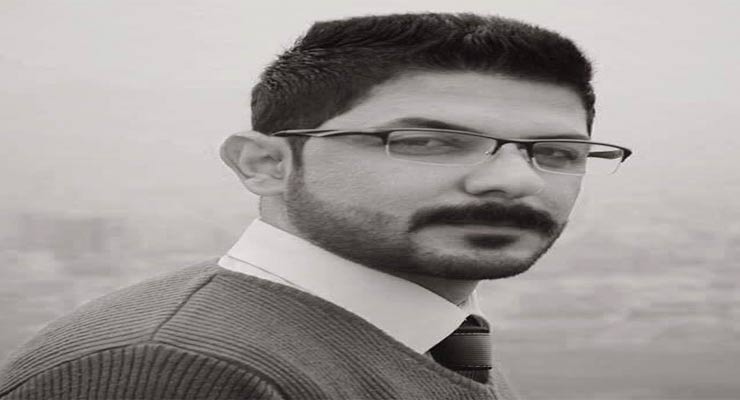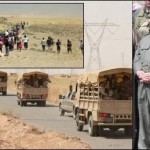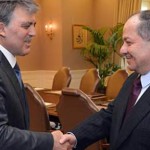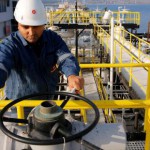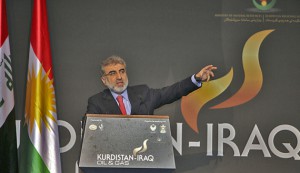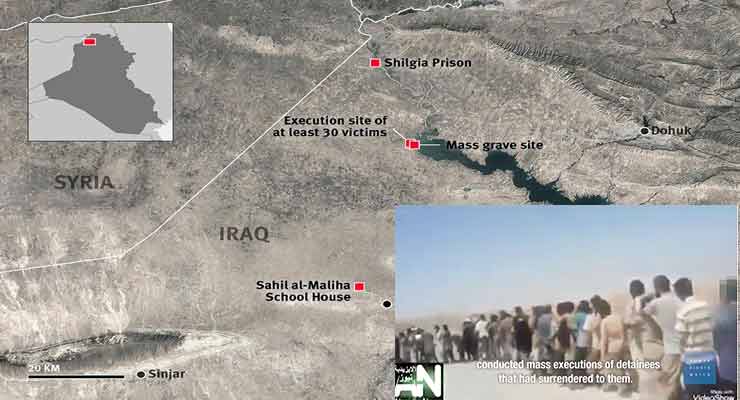
New evidence suggests that between August 28 and September 3, 2017, the Kurdistan Regional Government’s Asayish security forces from the West of the Tigris branch carried out mass executions of alleged Islamic State (also known as ISIS) fighters in their custody, which constitutes a war crime.
Mass Grave Located Near Bardiya Village
Because the mass grave site is located within the flood zone of the Mosul Dam reservoir, it is critically important to urgently allow international forensic experts to conduct a detailed exhumation of the site before seasonal rains fill the reservoir again later this year and submerge the grave site, complicating the identification of bodies, Human Rights Watch said.
Human Rights Watch was not able to speak with witnesses to the executions. But other evidence suggest that Asayish forces executed the ISIS suspects. Human Rights Watch spoke to a now-retired security force member, “Nadim,” who was regularly in contact with the Asayish members who told him they participated in the executions. Researchers also analyzed video and photographic evidence, including geotagged photos of bodies and satellite imagery showing the apparent mass grave was created sometime between July 5 and September 3 by bulldozer, and interviewed residents of a neighboring village.
Nadim went to one of the execution sites on August 29, where he said he saw approximately 30 bodies hours after the first group of men are believed to have been executed. Human Rights Watch visited a mass grave site where Nadim and local villagers said bodies were buried on January 30, 2018, and a second time on February 6.Nadim said that on August 29, a friend of his in the Asayish said that he and other Asayish members, all part of the West of the Tigris Asayish branch, had taken about 80 detainees suspected of ISIS affiliation from Shilgia prison the night before and had executed about 50 of them outside the village of Tal Ahmed Agha al-Kabir, and the others outside Bardiya village, which researchers visited.
Nadim said that a few hours later he traveled to the site near Bardiya, which he located based on information from locals who told him they discovered bodies there. There, he counted about 30 unburied bodies, all shot in the head, and took three photographs of them and two short videos. Human Rights Watch reviewed the photos and videos and was able to confirm based on their metadata that they were taken on August 29, 460 meters from a mass grave which was later created. In total, the photos and videos show at least 20 bodies of men. The bodies did not have visible injuries consistent with battle wounds or suicide attacks, were dressed in civilian clothing, and did not appear to have their hands bound or eyes blindfolded.
Nadim said that an Asayish security member also told him that in the evening of August 30, and through the early hours of the following morning, he and a group of other Asayish members loaded between 100 and 150 men into a large refrigerator truck, keeping them there, in freezing temperatures, for seven hours. They transported the men to the site of the previous executions near Bardiya, dumped the bodies of the men who had died in the truck from the cold or asphyxiation in a ditch, and shot and buried alongside them any who were still alive, he said.
Nadim’s statements were partially corroborated by photographic evidence posted on social media and another witness statement. A photo of what appears to be the truck that transported the detainees surfaced on Twitter on September 2 on at least two Twitter accounts, one of which has been suspended. One of the tweets states that Kurdish Peshmerga forces executed 375 ISIS members captured since August 27, northwest of Tal Afar. The other states that between August 27 and September 1, 375 ISIS fugitives from Tal Afar to Zummar and northwest al-A’yadhia were executed.
The photo shows a white truck and a pile of bodies underneath, in a ditch. A Bardiya villager also told Human Rights Watch that on an evening at the end of August, he saw Kurdish forces drive through the area with two large white refrigerator trucks.
The two tweets also included two other photos. One shows a man in what appears to be an Asayish uniform, his face painted over to hide his identity, standing over a pile of bloody bodies. The second shows over 15 bloodied bodies in a pile in an open grave. In both photos, the hands of some of the men appear to be bound.
Read More: https://www.hrw.org/news/2018/02/08/kurdistan-regional-government-mass-executions-detainees

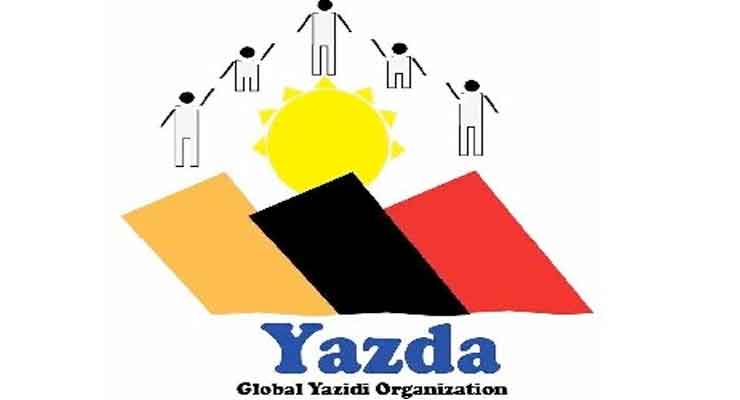 ERBIL, Kurdistan Region – Kurdish authorities confirmed that they have closed the office of the rights organization Yazda, which advocates on behalf of the Yezidi community, because it did not abide by the terms and conditions of Non-Governmental Organizations (NGOs) in the Region.
ERBIL, Kurdistan Region – Kurdish authorities confirmed that they have closed the office of the rights organization Yazda, which advocates on behalf of the Yezidi community, because it did not abide by the terms and conditions of Non-Governmental Organizations (NGOs) in the Region.